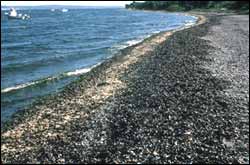Scripps-led Project Achieves Milestone in Analyzing Pollutants Dimming the Atmosphere
Technology behind unmanned aerial vehicles proves successful for flying beneath, above and through clouds to trace pollution particles
A scientific research consortium led by Scripps Institution of Oceanography at the University of California, San Diego, has reached an important milestone in the tracking of pollutants responsible for dimming Earth’s atmosphere.
Scripps O
Scientists at the Woods Hole Oceanographic Institution (WHOI) have completed two extensive survey and mapping efforts to better understand why the 2005 New England red tide was so severe and to suggest what might lie ahead. WHOI Senior Scientist Don Anderson and colleagues mapped the distribution of Alexandrium fundyense cysts in seafloor sediments immediately before and after the historic harmful algal bloom of 2005.
The first of these analyses shows unusually large numbers of cysts o
Scientists have reported an unprecedented number of unaccompanied and possibly abandoned walrus calves in the Arctic Ocean, where melting sea ice may be forcing mothers to abandon their pups as the mothers follow the rapidly retreating ice edge north.
Nine lone walrus calves were reported swimming in deep waters far from shore by researchers aboard the U.S. Coast Guard icebreaker Healy during a cruise in the Canada Basin in the summer of 2004. Unable to forage for themselves, th
A paper published today in the American Geophysical Union’s Journal of Geophysical Research-Oceans shows a method to recover valuable data from the primary tool used for measuring global sea level – satellite radar altimetry. Altimeter data are used, among other benefits, to monitor and predict the occurrence of events such as El Niño and La Niña – a coupled ocean-atmosphere phenomena that can alter global weather patterns.
Some six percent of global altimetry measurements are

A “dead zone” that formed in 2001 in Narragansett Bay left a lethal legacy, Brown University research shows. In a study of nine mussel reefs, published in Ecology, researchers report that oxygen-depleted water killed one reef and nearly wiped out the rest. A year later, only one of the nine reefs was recovering. The result was a sharp reduction in the reefs’ ability to filter phytoplankton, a process that helps control “dead zone” formation.
Fish kills, foul odors and closed beaches
Brown University geologists have created the longest continuous record of ocean surface temperatures, dating back 5 million years. The record shows slow, steady cooling in the eastern equatorial Pacific, a finding that challenges the notion that the Ice Ages alone sparked a global cooling trend. Results are published in Science.
Using chemical clues mined from ocean mud, Brown University researchers have generated the longest continuous record of ocean temperatures on Earth.